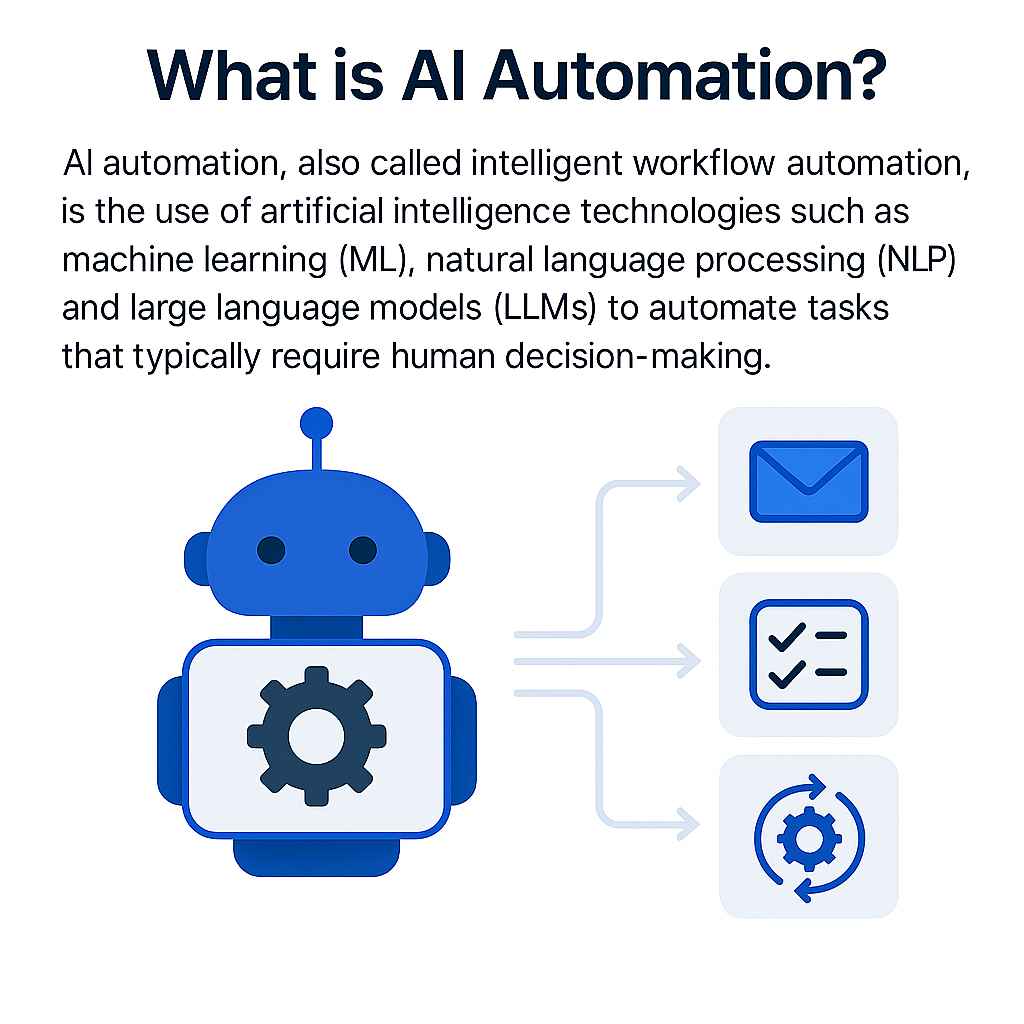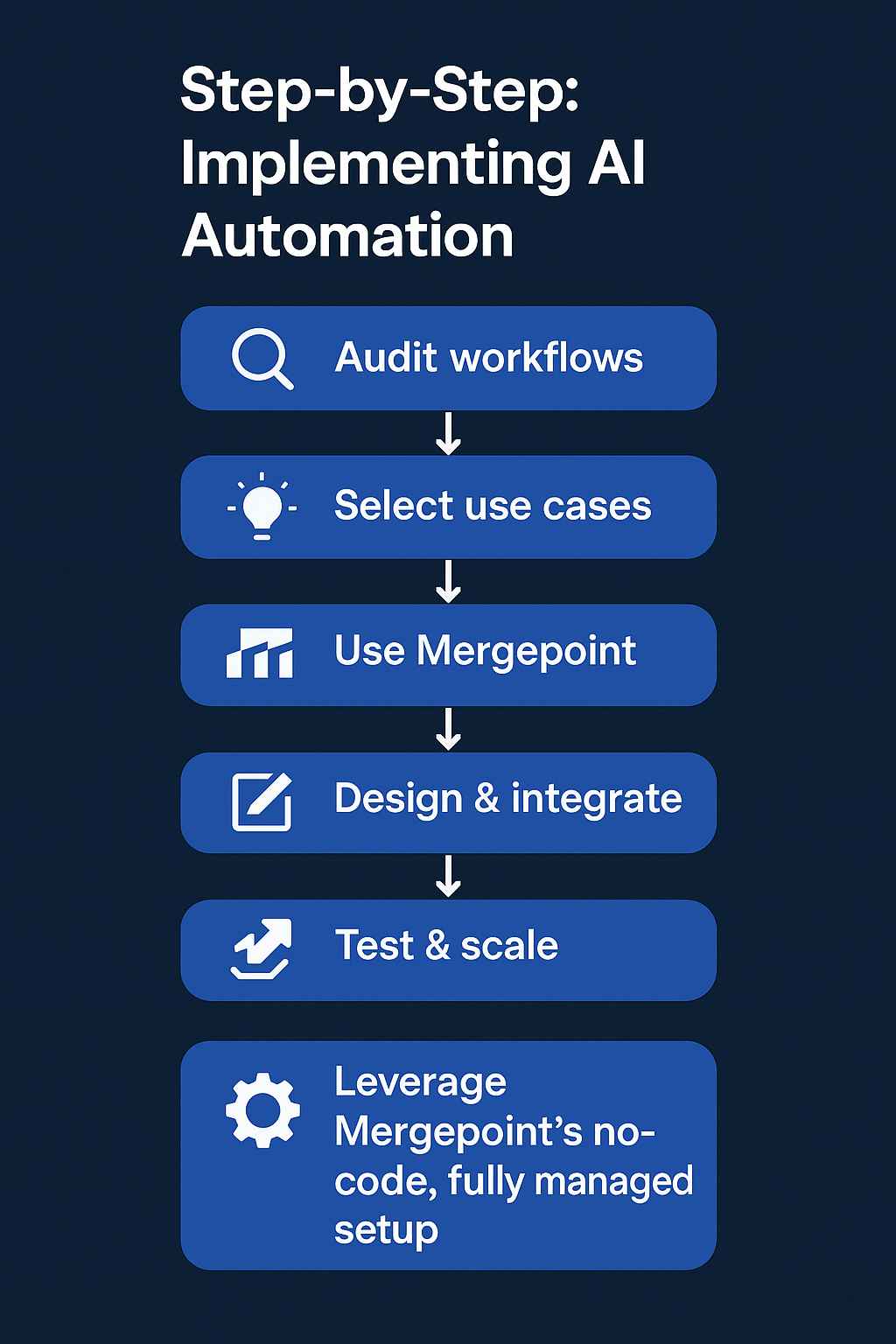What Is AI Automation and its Workflow Impact on Businesses

In today’s fast-moving business world, AI automation is no longer just a future concept. It has become essential for companies aiming to stay competitive. By using tools like machine learning (ML), natural language processing (NLP), and large language models (LLMs), AI helps businesses improve the way they work. Unlike traditional systems or manual processes that follow strict rules, AI makes smart decisions based on context and data. This article explains how AI automation works and the powerful benefits it can bring to growing businesses.
What Is AI Automation?
AI automation, also called intelligent workflow automation is the use of artificial intelligence technologies such as machine learning (ML) natural language processing (NLP) and large language models (LLMs) to automate tasks that typically require human decision-making.
This approach differs greatly from standard robotic process automation (RPA), which depends on rigid scripts, and legacy automation, which lacks intelligence and adaptability. AI adds a dynamic, learning component.
Unlike traditional automation, which follows fixed rules or scripts, AI automation can analyze data, process inputs like emails, documents, and chats, understand context, and make intelligent decisions. This makes it especially useful for handling complex workflows, responding to unpredictable situations, and continuously improving over time.

Core Components of AI Workflow Automation
- Triggers – Automated workflows begin on events such as email receipt, document uploads, or form submissions.
- AI Engine – NLP and LLMs interpret and understand unstructured data to inform decisions.
- Integrations – APIs link to ERP, CRM, and Third-party APIs.
- Actions & Feedback Loops – Automated outcomes execute (e.g., send email, update record), and feedback refines the AI model over time.
How AI Automation Works with Mergepoint?
MergePoint AI is a Singapore-based platform that delivers intelligent, no-code workflow automation for operations-heavy businesses across Southeast Asia. As an iPaaS (Integration Platform as a Service), we embed AI to streamline approvals, task routing, data extraction, and exception handling bridging ERPs, CRMs, spreadsheets, messaging apps, IoT inputs, and third-party APIs into a unified automation layer, without replacing your existing tools.
Trusted by logistics, F&B, and industrial service companies, MergePoint enables teams to scale efficiently without added headcount. Our platform provides real-time data visualization and predictive insights to support faster, smarter decisions resulting in:
✔️Reduced manual work
✔️Real-time operational visibility
✔️Increased speed and accuracy
✔️Measurable gains in efficiency and profitability
With Mergepoint’s no-code platform, all of this is built through a drag-and-drop interface no developers required. You can use similar workflows across business functions including sales, support, and operations.
Explore the full Mergepoint platform overview to see how easy it is to connect triggers, AI logic, and systems end-to-end.
Business Impact: Efficiency, Accuracy, ROI
AI automation delivers measurable benefits across various business functions. It saves time by instantly handling repetitive tasks, often freeing up 30–50 hours per week per team. It reduces errors, notably improving invoice and data accuracy. With AI systems operating 24/7, businesses can scale operations seamlessly to match demand fluctuations. Cost savings are also substantial, with many organizations reporting 10–50% reductions in process costs. Additionally, real-time data insights lead to better decision-making and faster response times.
An AI-powered healthcare billing system saved 15,000 hours per month, cut documentation time by 40%, and achieved a 30% return on investment, according to Business Insider. Similarly, logistics firms using AI for route optimization have reported up to 20% fuel savings, and manufacturers leveraging predictive maintenance saw downtime reduced by 25–30%, resulting in millions saved annually.
Use Cases Across Industries
Financial Services
Mergepoint streamlines financial operations by automating expense tracking, fraud detection, and compliance reporting. AI can scan and categorize receipts, monitor transactions for anomalies, and generate audit-ready reports all with minimal manual effort. This enables finance teams to operate faster, reduce errors, and stay compliant in real time.
Lending Services
Lending workflows are streamlined through automation of underwriting, asset valuation, and debt recovery. AI evaluates alternative borrower data such as B2B transactions and supplier payments, estimates fair market value for repossessed vehicles, and personalizes late payment reminders enhancing risk assessment and improving loan recovery rates.
Property Management
Property management are simplified through AI-powered tenant screening, market pricing, and fraud detection. The platform processes rental applications by analyzing credit, employment, and lease history; recommends competitive rent using local market data; and flags suspicious entries to help property managers make faster, safer decisions.
Heavy Equipment
Mergepoint provides end-to-end automation for heavy equipment businesses by streamlining equipment diagnostics, service coordination, and rental operations. For rental equipment, the platform automates renter qualification by analyzing credit scores, verifying employment, checking backgrounds, and reviewing lease history. It also generates comparative market reports, using AI to analyze equipment rental comps, usage trends, and demand forecasts to recommend competitive pricing. Additionally, Mergepoint enhances fraud detection by flagging suspicious applications such as falsified credentials or identity mismatches ensuring safer and faster rental processing.
Dealership Aftersales Activities
Dealerships are able to automate service appointment scheduling, parts reordering, and post-service surveys. AI also helps track customer behavior and triggers timely follow-ups to drive loyalty and upsells.
Inventory Visibility & Insights
Real-time inventory systems powered by AI provide instant visibility into stock levels, helping businesses make informed supply decisions. These systems can flag low inventory, predict demand trends based on historical data, and automate restocking processes minimizing the risk of shortages or overordering. Mergepoint integrates seamlessly with these tools to enable intelligent, end-to-end inventory automation.
Mergepoint’s customizable, no-code flows smoothly integrate across departments, delivering operational agility and insight making it the ideal AI automation agency for modern businesses.
Step-by-Step: Implementing AI Automation
- Audit your workflows to identify repetitive tasks.
- Select use cases with clear ROI potential—like invoice exceptions or email triage.
- Choose a platform, such as Mergepoint. See how it works.
- Design & integrate with ERP, CRM, and messaging systems.
- Test & scale, ensuring human oversight and governance.
- Leverage Mergepoint’s no‑code, fully managed setup, reducing time-to-value and resource burden.

Challenges & Best Practices
Data Privacy & Security
As AI workflows process large volumes of sensitive data such as personal information, financial records, or business-critical transactions organizations must implement robust data privacy and security measures. This includes end-to-end encryption, role-based access controls, and secure API connections.
Change Management
One of the most overlooked challenges in automation projects is resistance to change. Without early stakeholder involvement and transparent communication, teams may feel threatened by AI systems or be unclear on how new workflows affect their roles. To overcome this, organizations should involve key users from the start through workshops, pilot programs, and internal demos so they feel part of the process.
Human-in-the-Loop Oversight
While AI can handle a vast majority of tasks autonomously, exceptions and edge cases still require human judgment. Introducing a human-in-the-loop (HITL) mechanism ensures quality control where business decisions have legal, ethical, or financial consequences. For example, in lending or compliance workflows, final approvals or anomaly reviews can be routed to a human reviewer. Mergepoint allows workflows to be configured with conditional steps for escalation and manual intervention where needed.
Ongoing Monitoring & Optimization
AI models are only as good as the data and feedback they receive. Without continuous monitoring, automation can drift leading to degraded performance or biased decisions. Best practice involves setting up performance dashboards, real-time error logs, and regular feedback loops to refine logic and retrain models.
Scalability & Flexibility
As business needs evolve, automation systems must be able to scale. Rigid, hard-coded solutions may work initially but quickly become bottlenecks. The best practice is to design modular, extensible workflows that can adapt to changes in tools, team structures, or customer behavior. Mergepoint’s platform supports this with reusable logic blocks, centralized integration management, and no-code flexibility making it easier to clone, scale, and evolve workflows without starting from scratch.
Future Outlook
The future of AI workflow automation is rapidly shifting toward greater autonomy and intelligence. With advancements in large language models (LLMs), businesses will move beyond rule-based automation to self-learning AI agents capable of identifying bottlenecks, adapting workflows, and responding to organizational changes without manual input. These agents will drastically reduce human intervention, increasing both speed and operational agility.
We’ll also see broader adoption of AI across complex functions like legal document review, customer service, and supply chain coordination. AI will be able to interpret unstructured data, make decisions in real time, and handle tasks traditionally reliant on human judgment. Simultaneously, the rise of natural language interfaces will empower non-technical users to build and manage workflows simply by typing commands eliminating the need for coding and making automation more accessible across roles.
In industries like manufacturing and logistics, the convergence of AI and IoT will enable proactive operations. Machines will send signals like fault codes or inventory alerts that trigger automated workflows for maintenance or resupply. As this evolves, adaptive governance models will become essential, allowing AI systems to align with compliance and risk standards, especially in regulated sectors such as finance, healthcare, and real estate.
According to Gartner, by 2026, over 75% of large enterprises will use AI-powered automation to improve agility, reduce costs, and boost resilience. Mergepoint is already paving the way with no-code, AI-first platforms that scale with business growth and evolving tech landscapes.
In a Nutshell
AI workflow automation is no longer just a productivity tool, it’s a strategic enabler of modern business. By harnessing the combined power of machine learning (ML), natural language processing (NLP), and large language models (LLMs), organizations can streamline operations, reduce manual errors, accelerate decision-making, and achieve scalable efficiency across every department.
With Mergepoint’s no-code platform, companies can eliminate the complexity of traditional automation tools and siloed systems. From finance and lending to property management and heavy equipment, Mergepoint enables teams to automate intelligently, respond faster, and drive performance with ease all through a user-friendly interface designed for business users.
Whether you're automating a single process or deploying a company-wide strategy, Mergepoint provides the flexibility, support, and intelligence needed to thrive in the AI era.
Explore what AI workflow automation can unlock for your team—schedule a Mergepoint demo today. Experience the future of intelligent operations, purpose-built for scale and simplicity.





